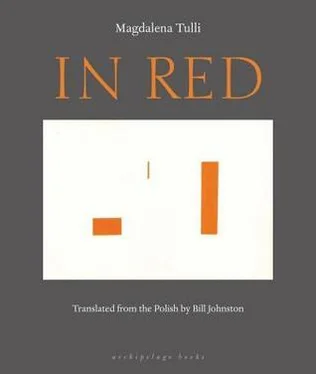Magdalena Tulli - In Red
Здесь есть возможность читать онлайн «Magdalena Tulli - In Red» весь текст электронной книги совершенно бесплатно (целиком полную версию без сокращений). В некоторых случаях можно слушать аудио, скачать через торрент в формате fb2 и присутствует краткое содержание. Год выпуска: 2011, Издательство: Archipelago Books, Жанр: Современная проза, на английском языке. Описание произведения, (предисловие) а так же отзывы посетителей доступны на портале библиотеки ЛибКат.
- Название:In Red
- Автор:
- Издательство:Archipelago Books
- Жанр:
- Год:2011
- ISBN:нет данных
- Рейтинг книги:3 / 5. Голосов: 1
-
Избранное:Добавить в избранное
- Отзывы:
-
Ваша оценка:
- 60
- 1
- 2
- 3
- 4
- 5
In Red: краткое содержание, описание и аннотация
Предлагаем к чтению аннотацию, описание, краткое содержание или предисловие (зависит от того, что написал сам автор книги «In Red»). Если вы не нашли необходимую информацию о книге — напишите в комментариях, мы постараемся отыскать её.
In this inventive novel, Magdalena Tulli creates a world that is unreal, yet strangely familiar and utterly convincing. Set in a mythical fourth partition of Poland,
is full of haunting descriptions of the town and its inhabitants; its power lies in Tulli's evocative, almost hallucinatory use of language.
In Red — читать онлайн бесплатно полную книгу (весь текст) целиком
Ниже представлен текст книги, разбитый по страницам. Система сохранения места последней прочитанной страницы, позволяет с удобством читать онлайн бесплатно книгу «In Red», без необходимости каждый раз заново искать на чём Вы остановились. Поставьте закладку, и сможете в любой момент перейти на страницу, на которой закончили чтение.
Интервал:
Закладка:
No sleep, no respite. Bright daylight twenty-four hours a day, aside from a single moment of dark decline that passed unnoticed long before the clanging of the first streetcars. It was hot and close, the way it is before a storm. Restless crowds surged along the bottlenecks of the streets. There was a painful shortage of space. On the shop signboards two languages were at odds with one another, tattered bilingual posters fluttered on the walls, a leftover from a referendum held in accordance with international treaties. One and the same town hall clock measured out a common time for the multitude of pocket watches and wristwatches; one golden weathercock was reflected in a thousand pairs of eyes. Anyone who wanted the space, the clock, and the weathercock for himself alone would first need to find a way to get rid of the crowds of others desiring the same thing, stepping in his way, treading on his heels.
The cries were silent still, compressed like air in a bottle of spoiled wine about to explode. Amid a furious honking of horns, horse-drawn cabs would be weaving between gasoline-powered cabriolets with chrome-plated radiators. A newspaper seller in a checkered cycling cap would collide with a corpulent bank clerk; an argument would follow, and within moments a flock of onlookers was obstructing the traffic. In a streetcar an insolent Realschule student would refuse to give up his seat to a professor from the classical grammar school, who would respond by striking the boy on the forehead with his cane so infelicitously that the streetcar had to be stopped and a doctor summoned. Workers from the factories of Slotzki, Neumann, and Loom, marching grimly down the street and occupying its whole width, found their way blocked by detachments of mounted gendarmes, who in the ensuing fracas forced them into the dark depths of gateways from which there was no escape.
NO ONE WAS WAITING FOR NATALIE ZUGOFF ON THE STATION platform when she alighted from the sleeping car of the Paris express beneath the cast-iron arches of a glass roof high as the sky, and dulled and darkened from soot. With a miniature Chinese lapdog curled up in her muff and a little black boy in livery who stared at everything and pressed his ear to a music box, Natalie Zugoff headed for the exit without troubling herself about her luggage. The cylinder of the music box revolved indefatigably, repeating its little tune amid the hubbub, unchanging as the stamp of a solitary fate impressed on random pictures in the main hall of the station, and just as faint.
That same morning the director of the theater, a corpulent gentleman by the name of Jacques Rauch, looked about for Natalie Zugoff then began to make his way through the crowd of travelers leaving the platform, toward her abandoned luggage. The porters he summoned picked up the suitcases, monogrammed and extraordinarily heavy — fifteen items, not including hatboxes — lugged them the length of the platform, and crammed them with the utmost difficulty into an automobile sent from the Hotel Angleterre.
“What’s she bringing?” they grumbled. “Rocks?”
“Women! They say she took all this stuff and left Russia to get away from the Bolsheviks,” Rauch said to the chauffeur, who had placed his cap with the band marked “Angleterre” on the dashboard and was squatting and examining the overloaded wheels.
“I just hope the axles hold out,” he murmured.
Natalie Zugoff seemed accustomed to the fact that her bags followed her of their own accord. There had never yet been a lack of volunteers willing to see to them. They’d been looked after by officials of the British legation in Odessa, White Russian officers, sailors of the Black Sea Fleet, and agents of the French immigration authorities. The stationmaster, whom she had cast merely a fleeting glance, had without being asked taken the small valise from her hands and carried it himself to the hotel automobile in hopes that the velvety gaze would rest once again on his vulgar person. Called away by urgent business, in a farewell gesture he leaned down to the hand clad in a net glove; the Chinese lapdog snarled and bared its teeth.
Having handed out tips and sent the porters away, Rauch waited for a word of thanks for his solicitude in taking care of the cases, whose dispatch had been overseen in Paris by another director of a variety theater. Natalie Zugoff thanked him, and glanced with aversion at the immense pile of luggage in the hotel automobile. It drove at a snail’s pace behind the dorozhka that the driver had had to flag down for Rauch and the artiste. The wind brought the distant sound of isolated shots. A petard went off under the horses’ hooves; they took fright and bolted, the lapdog yelping in distress.
“Goddammit!” the cabbie swore, tugging at the reins. “Whoa, whoa!”
Zigzagging through the streets as if they were the tunnels of a labyrinth, arriving from the direction of the port they pulled up outside the Hotel Angleterre, where they were stopped by a police cordon.
“There’s a cannon on the tower,” said Natalie Zugoff.
“It’s been there since time immemorial, ma’am,” she was reassured by a policeman. He clicked his heels, gave back her documents, and saluted.
Even before dinnertime fifteen men in dark blue sweat-soaked uniforms had brought the cannon down from the town hall tower. It was fired in celebration, upon which its wheels dropped off, and its bronze barrel cracked and came to rest outside the town hall, sparing Natalie Zugoff’s delicate ears another report. From the window of her hotel room she saw scraps of newspaper being swept down the street by the wind, while stray mongrels slunk by against the buildings, their tails between their legs. She sent for a train timetable, having made up her mind to break her contract and return as quickly as she could to Paris. In the evening she appeared on stage, the only performance she agreed to give before leaving. Her voice, mournful and restless, soared over the band’s fortissimo like the cry of a bird, the sounds of the saxophones rising up in its wake and gasping. The voice glided high up, trembling with bitter scorn for bourgeois harmony. It misled the musicians into sandpits of dissonance, from which they extracted themselves only with the most precipitous twists and turns, hastily closing ranks to return with fanfares, violin in the lead, onto the straight and narrow. Natalie Zugoff paid no more attention to the band than she had to the pile of luggage that had been following behind her for years. Her insouciance astounded the bank clerks sprawling in the orchestra seats in their impeccable tuxedos and shoes gleaming like mirrors.
“She’s going to bomb,” predicted Alojzy Piechota, the former fireman, peeping through the curtains at the audience, before resuming his rounds. Yet when the chords of the final number died away, the dead silence among the spectators gave way to a hurricane. The bank clerks jumped to their feet as they applauded; legal interns overwhelmed by a touch of boundless freedom abandoned their good manners, leaped onto their seats and shouted at the top of their lungs.
“Voilà,” Rauch said excitedly as he listened from the director’s box. He shook the black boy’s hand, expecting congratulations. “They’re cheering! Can you hear? Today they sound the way they should, more than ever before in this place. Let’s enjoy it — the cork is out of the bottle.”
But the brand-name champagne that had been chilling in an ice bucket for Rauch to celebrate the success made him grimace in disgust. The contents of the bottle were spoiled.
For many weeks the evening shows were sold out. The house was filled to the rafters with single men listening intently to the mournful voice, mesmerized by the shiny black top hat, the ostrich-feather boa, and the pale arm bearing a ladies’ cigarette in a long glass holder, all seen through wreaths of smoke in a bluish light. The chandeliers shook from the applause, and the grammar school boys, whose rules forbade them to enter Rauch’s theater, threw caution to the winds and waved their dark blue caps, leaning perilously out from their seats up in the gods.
Читать дальшеИнтервал:
Закладка:
Похожие книги на «In Red»
Представляем Вашему вниманию похожие книги на «In Red» списком для выбора. Мы отобрали схожую по названию и смыслу литературу в надежде предоставить читателям больше вариантов отыскать новые, интересные, ещё непрочитанные произведения.
Обсуждение, отзывы о книге «In Red» и просто собственные мнения читателей. Оставьте ваши комментарии, напишите, что Вы думаете о произведении, его смысле или главных героях. Укажите что конкретно понравилось, а что нет, и почему Вы так считаете.












